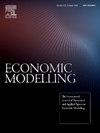Peer influence and inflation expectations: Evidence from households’ social comparisons
IF 4.7
2区 经济学
Q1 ECONOMICS
引用次数: 0
Abstract
This paper investigates how personal income changes and social comparisons shape inflation expectations among Indian households, using an ad hoc household survey and data from the Reserve Bank of India’s Consumer Confidence Survey. In line with the literature, we find that a decrease in income leads to higher expectations because of increased financial constraint. But we also find a novel pattern: households whose income increases also report higher inflation expectations. This is attributed to aspirational goals and social comparisons that households indulge in. Households wish to be relatively better off compared to their peers, and the inability to improve their relative position is attributed to external factors such as higher inflation. Our findings reveal a previously overlooked behavioral channel in expectation formation and contribute to understanding heterogeneity in household macroeconomic beliefs. It also highlights how social comparison and inequality can impact inflation levels in the economy through inflation expectations.
同伴影响与通胀预期:来自家庭社会比较的证据
本文利用一项临时家庭调查和印度储备银行消费者信心调查的数据,研究了个人收入变化和社会比较如何影响印度家庭的通胀预期。与文献一致,我们发现收入的减少导致更高的期望,因为财政约束增加。但我们也发现了一种新的模式:收入增加的家庭也会报告更高的通胀预期。这是由于家庭沉迷于理想目标和社会比较。家庭希望相对于他们的同龄人过得更好,而无法改善他们的相对地位是由于外部因素,如更高的通货膨胀。我们的研究结果揭示了先前被忽视的预期形成的行为渠道,并有助于理解家庭宏观经济信念的异质性。它还强调了社会比较和不平等如何通过通胀预期影响经济中的通胀水平。
本文章由计算机程序翻译,如有差异,请以英文原文为准。
求助全文
约1分钟内获得全文
求助全文
来源期刊

Economic Modelling
ECONOMICS-
CiteScore
8.00
自引率
10.60%
发文量
295
期刊介绍:
Economic Modelling fills a major gap in the economics literature, providing a single source of both theoretical and applied papers on economic modelling. The journal prime objective is to provide an international review of the state-of-the-art in economic modelling. Economic Modelling publishes the complete versions of many large-scale models of industrially advanced economies which have been developed for policy analysis. Examples are the Bank of England Model and the US Federal Reserve Board Model which had hitherto been unpublished. As individual models are revised and updated, the journal publishes subsequent papers dealing with these revisions, so keeping its readers as up to date as possible.
 求助内容:
求助内容: 应助结果提醒方式:
应助结果提醒方式:


